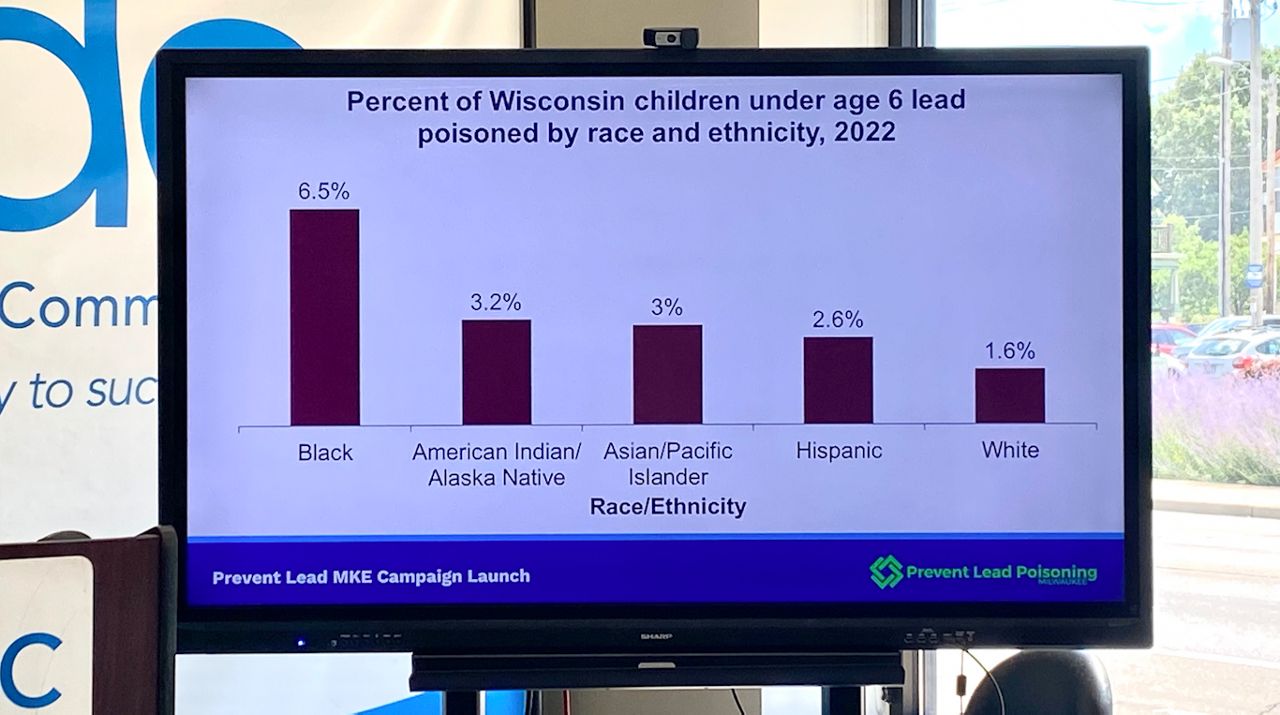MILWAUKEE — The Prevent Lead Milwaukee Coalition launched the Prevent Lead MKE initiative Thursday.
The initiative creates and raises awareness on the effects of lead poisoning and preventing of lead exposure. The coalition includes the City of Milwaukee Health Department, the Wisconsin Department of Health Services and the Social Development Commission.
According to Prevent Lead Poisoning Milwaukee, Milwaukee’s lead issue is rooted in two main factors. First, the city’s older housing stock, built before the 1978 ban on lead-based paint. That exposes residents to potential lead hazards. Secondly, the historical use of lead service lines, mandated since 1872, has led to a significant number of properties still being serviced by lead pipes, contributing to the persistence of lead contamination in the water supply.
It’s a problem Ofelia Mondragon has experienced first-hand. As a mother of three, she said it was important for her to learn more about lead poisoning and how it could impact her family.

“We found out that one of my kids got exposed to lead,” Mondragon said. “That was eye opening for me and that really gave me the opportunity to understand that it was a problem, but also, we had a problem informing the community about this issue.”
Mondragon is the Healthy Homes lead abatement program manager at the Social Development Commission and part of the Prevent Lead MKE campaign.
The campaign aims to prioritize prevention through funding, policies and education.
Brian Weaver, a DHS lead policy adviser, said these three pillars are the foundation of the initiative. He said funding will help fix lead hazards in housing before children are lead poisoned. Policies would ensure lead-safe housing and childcare facilities. The education will help families so they can protect their children from lead.
“We are really focusing on efforts in the state to provide funding for property owners, landlords, homeowners to fix up their properties so we can eliminate those lead hazards and eliminate lead poisoning in the first place,” said Weaver.
Weaver said DHS also provides the Wisconsin Lead-Safe Homes Program (LSHP). This program makes homes safe by removing lead hazards. It also makes homes safe for kids or pregnant women that are on Medicaid or BadgerCare Plus in Wisconsin.
“On average, we have about 3,000 childhood lead poisoning cases happen in Milwaukee, which has an older housing population,” he said. “We often see this happening in properties that are not well maintained. They are often rental properties.”

Mondragon said lead exposure can lead to cognitive issues, developmental delays, and learning disabilities, especially in children.
“We’re empowering the community to know about the issue then take action to find resources and change policies to make sure we are protecting the health of our children,” she said.
The DHS said while lead can hurt anyone, the health effects of lead exposure are particularly damaging for kids under the age of six. Lead poisoning among children is typically caused by swallowing or breathing in dust from lead-based paint in homes that were built before 1978.
In 2021, the CDC (Centers for Disease Control and Prevention) updated the blood lead reference value to 3.5 micrograms per deciliter (µg/dL). This level helps public health authorities identify children with higher levels of lead in their blood compared to most children. The value was previously 5 micrograms per deciliter.
Dr. Heather Paradis with the Medical Director with the City of Milwaukee Health Department said the long-standing effects come from chronic exposure over time. She said lead poisoning is considered a silent illness.
“We know that lead visioning peaks between the ages of one to two-years-old, when children are having that exploratory type of behavior on the ground,” said Paradis. “It’s really important that they’re getting in for their regular check-ups.”
As those involved in this campaign step up the effort to combat the negative effects of lead, Mondragon said the primary goal is to protect children.
“It’s not just one child, we’re talking 2,000 each year in the city of Milwaukee,” she said.
She encourages everyone to get informed and get involved, hoping to eliminate lead poisoning in the county overall.
Correction: A previous version of this story misspelled Ofelia Mondragon's name. The error has been corrected. (Aug. 18, 2023)



